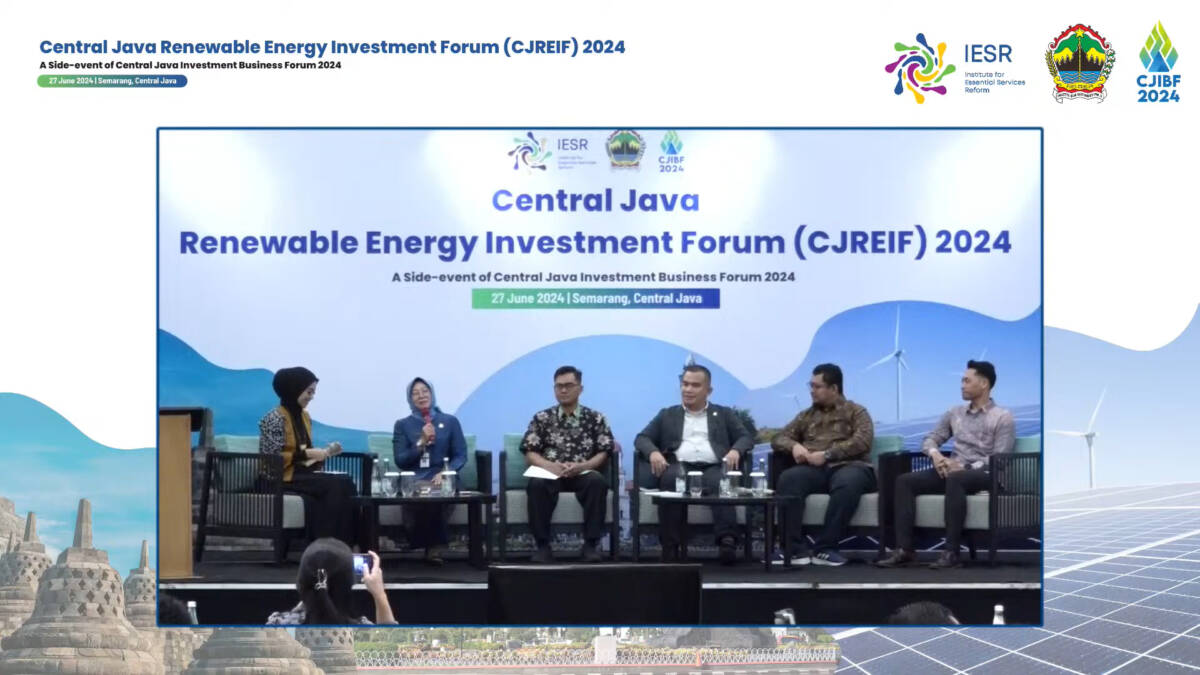Semarang, June 27, 2024 – The Central Java Provincial Government is actively seeking to attract more investment in the renewable energy sector, in line with the growing global investment trend in sustainable energy.
Fabby Tumiwa, Executive Director of the Institute for Essential Services Reform (IESR), stated at the “Investment Forum and Business Meeting on Potential Investment in the Renewable Energy Sector in Central Java” that to attract investment in the renewable energy sector and utilize Central Java’s abundant potential, the local government needs to take four key actions. First, establish measurable renewable energy policies and targets. Second, provide incentives for both renewable energy users and developers. Third, promote investment by highlighting the potential of renewable energy projects. Fourth, lead by example in adopting renewable energy technologies, such as rooftop solar power systems.
According to him, non-fiscal incentives need to be a priority to encourage the wider use of renewable energy.
“Non-fiscal incentives must be prioritized. For example, making licensing more streamlined and free of charge, and providing employment or skilled labor that can be utilized by investors or developers, so they do not need to look elsewhere. The government needs to assist in the provision of land, which has often been an obstacle to the development of infrastructure projects,” said Fabby at the event organized by IESR in collaboration with the Central Java Provincial Government through the One-Stop Investment and Integrated Services Agency (Dinas Penanaman Modal dan Pelayanan Terpadu Satu Pintu, DPMPTSP).
Nana Sudjana, Acting Governor of Central Java, in his remarks represented by Sakina Rosellasari, Head of the One-Stop Investment and Integrated Service Office (DPMPTSP) of Central Java Province, said that the climate crisis puts Central Java among the global top 100 regions at the highest risk of economic energy damage from 2,600 regions worldwide in the next few years. For this reason, Central Java strives to reduce emissions that cause a rise in the Earth’s temperature and climate change through various policies and actions, including the implementation of circular economy initiatives and encouraging the transition to a green economy.
“To realize the progress of welfare and environmental sustainability, a synergy of performance and harmony between state-owned enterprises, industry, and society is needed,” said Nana.
Furthermore, he emphasized that the Central Java Government is committed to increasing the renewable energy mix to 21.82% by 2025. Until 2023, the renewable energy mix had only reached 15.98%. Therefore, in the remaining two years, acceleration is needed to achieve the set target.
In the renewable energy sector, the Central Java Government has four Investment Projects Ready to Offer (IPRO): the Banjaran and Logawa Mini Hydro Power Plants in Banyumas Regency, the Wadaslintang Reservoir Floating Solar Power Plant, the Geothermal Power Plant Development at Umbul Telomoyo Temple, and the Baturraden Geothermal Power Plant Development in Banyumas Regency.
Sakina Rosellasari, Head of the Capital Investment and One-Stop Integrated Service Office (DPMPTSP) of Central Java Province, said that the challenge in attracting investment in the renewable energy sector is that it requires long preparation from the research stage to trials, with a large investment value and special regulations that need to involve PLN, including the construction of special networks and certain contracts.
Sakina hopes for cooperation between central and local government authorities in issuing policies that facilitate investment in Indonesia.
“The authority for licensing related to renewable energy is mostly centralized, while at the provincial level it is limited to the use of surface water (for floating solar power plants) and vehicle taxes. Therefore, we provide incentives in these two areas that fall under provincial authority. We hope to collaborate with the central government,” Sakina added.
Regarding the need for investors to use renewable energy, Dian Herizal, Senior Manager of Commerce and Customer Management at PLN UID Central Java and Yogyakarta, said that PLN UID Central Java and Yogyakarta provides renewable energy certificates, so investors do not need to wait for new infrastructure development.
Concerning the most efficient renewable energy generation, Awe Tsamma, Head of Public Affairs at SUN Energy, stated that solar power plants are among the most efficient. Installation is easy, and construction is faster compared to other energy plants. Awe noted that the latest regulation on rooftop solar power plants in Minister of Energy and Mineral Resources Regulation No. 2/2024 provides sufficient clarity for its implementation.
Gerry Julian, Country Director of PT WPD Indonesia Energy, added that in addition to solar power plants, wind power plants are also proven and environmentally friendly technologies. He stated that Central Java has significant wind power potential in several areas, including Brebes, Tegal, Pemalang, and Wonogiri. This potential can be a strategic asset to achieve the renewable energy mix target in Central Java. However, some challenges faced by developers include land availability and the absence of a quota for wind power plants in PLN’s 2021-2030 RUPTL (business plan), creating high uncertainty for investors.
“We sincerely hope that the RUPTL document will be released soon with a significant increase in the quota for wind power plants so that we can help accelerate the realization of additional renewable energy in Indonesia,” he added.
Another energy source mentioned at the forum was the waste-to-energy plant. Setyawan, Head of the Waste Management, Hazardous Waste, and Capacity Building Division at the Cilacap Regency Environmental Agency, said that his party had processed up to 150 tons of waste per day in 2021 into Refuse Derived Fuel (RDF) as fuel for the waste-to-energy plant.
Keywords: Investment, Renewable energy investment, Central Java, IESR, Fabby Tumiwa, Solar Power Plant, Non-fiscal incentives, Climate crisis, Central Java energy mix, PLN, Wind power plant, Central Java Investment and One Stop Integrated Service Office

